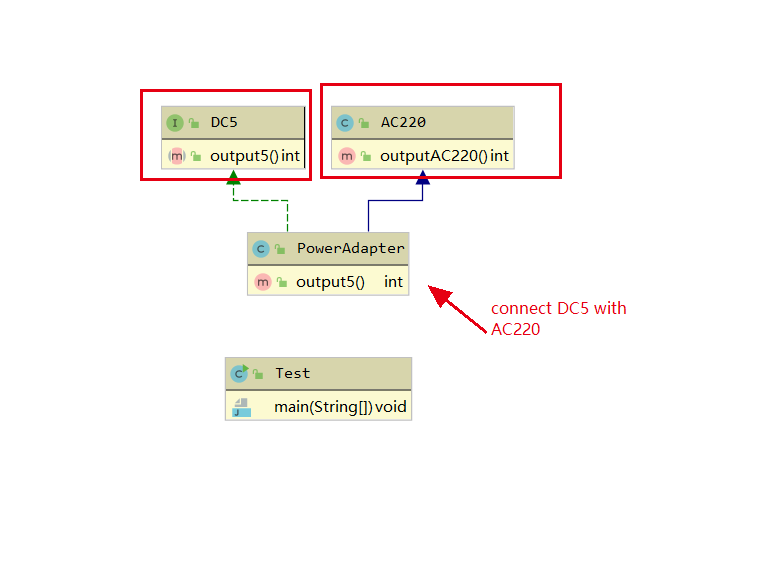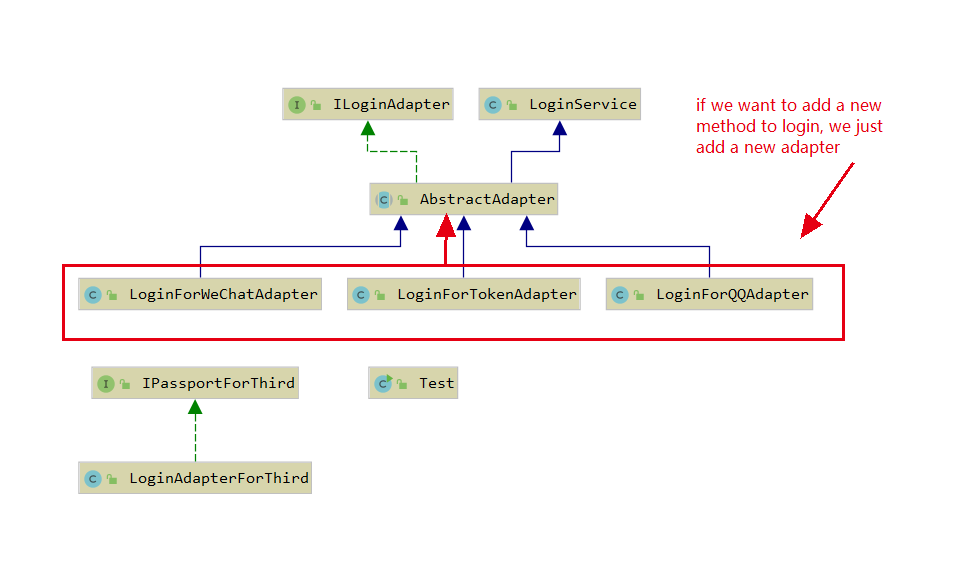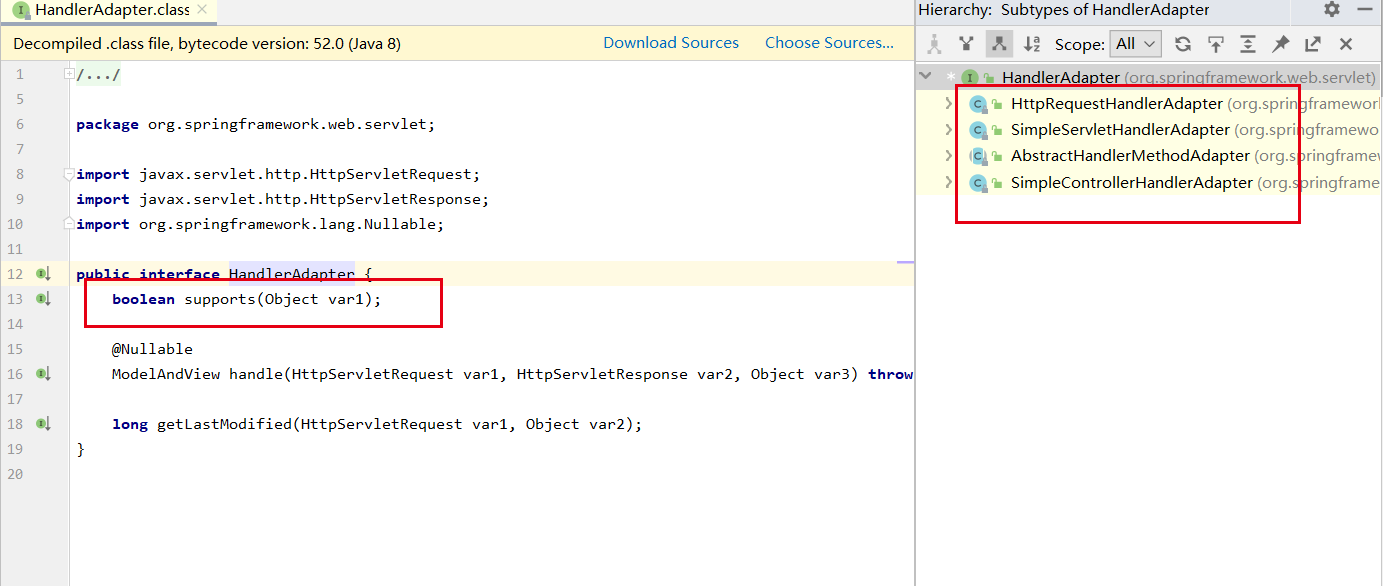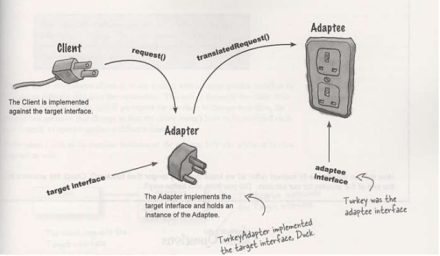(Adapter Pattern)
(Adapter Pattern)
Its function is to turn the interface of one class into another interface that the client expects, so that classes that would otherwise not work together due to interface mismatch work together. In short, there was a function before, but the new feature requires some code from the original function, and we don't want to develop a new one, so we create a new adapter so that it can be used。Similarly, the function of the mobile phone charging adapter,Our mobile phone charger has a very head, a double-ended three-head, we can use an adapter to insert the three-ended, two-ended plug into the adapter, and then the adapter for power input.Function:Resolve compatibility issues with different features Common Formulation:Class adaptation, interface adaptation, and object adaptation
Class Adapter

public class AC220 { public int outputAC220(){ int output=220; System.out.println("outPut"+output); return output; } } public interface DC5 { int output5(); } public class PowerAdapter extends AC220 implements DC5 { public int output5() { int adapterInput=super.outputAC220(); int adaptOutput=adapterInput/44; System.out.println("adapterInput:"+adapterInput+"adaptOutput:"+adaptOutput); return adaptOutput; } }
To test
public class Test { public static void main(String[] args) { DC5 powerAdapter=new PowerAdapter(); powerAdapter.output5(); } }
To explain
The Least Knowledge Principle would be against(bacause in PowerAdapter we can use methods of AC220)
Object adapter
public class PowerAdapter implements DC5 { private AC220 ac220; public PowerAdapter(AC220 ac220) { this.ac220 = ac220; } public int output5() { int adapterInput=ac220.outputAC220(); int adaptOutput=adapterInput/44; System.out.println("adapterInput:"+adapterInput+"adaptOutput:"+adaptOutput); return adaptOutput; } }
To explain
Actually,we just pass on object by construction,the problem of Least Knowledge Principle will be solved easily, but do we need create each adapter for each new classes?it is too complex to create adatper for each new classes ,so we use interface adapter to solve the problem
interface adapter
public class PowerAdapter implements DC { private AC220 ac220; public PowerAdapter(AC220 ac220) { this.ac220 = ac220; } public int outPut5V() { // can be use ac220.outputAC220(); System.out.println("outPut5V"); return 5; } public int outPut12V() { // can be use ac220.outputAC220(); return 12; } public int outPut24V() { // can be use ac220.outputAC220(); System.out.println("outPut24V"); return 24; } } public interface DC { int outPut5V(); int outPut12V(); int outPut24V(); }
To Test
public class Test { public static void main(String[] args) { DC powerAdapter=new PowerAdapter(new AC220()); powerAdapter.outPut5V(); powerAdapter.outPut12V(); powerAdapter.outPut24V(); } }
To explain
apparently, Interface Adapter like a proxy pattern,we pass on class named AC220 then to reconstruct method of class of AC220
A scene of login to illustrate how to use Adapter Pattern
that is our kernel class to process logic of login
public class LoginService { // to do register protected ResultMeg register(String userName, String password) { System.out.println("succeed in register" + userName + ":" + password); return null; } // to do login protected ResultMeg login(String userName, String password) { System.out.println("succeed in login" + userName + ":" + password); return null; } }
we need an adapter to redirect all of third party login
- we create an interface to restrict all thrid part login(IPassportForThird)
- we extends LoginService ,which can use method of LoginService(actually,that is class that we shoud adapt)
- because each thrid part login have different logic,we haven't to write all logic in the same class named LoginAdapterForThird,so we have to have a method named processLogin to distribute all requirement into each calsses
tips: the method named support is to verify rationality of classes
public class LoginAdapterForThird implements IPassportForThird { // login for QQ public ResultMeg loginForQQ(String openId) { return processLogin(openId, LoginForQQAdapter.class); } // login for WeChat public ResultMeg loginForWeChat(String openId) { return processLogin(openId, LoginForWeChatAdapter.class); } // login for Token public ResultMeg loginForToken(String token) { return processLogin(token, LoginForTokenAdapter.class); } // all third part login are distributed with this method private ResultMeg processLogin(String id, Class<? extends ILoginAdapter> clazz) { try { ILoginAdapter iLoginAdapter = clazz.newInstance(); if (iLoginAdapter.support(iLoginAdapter)) { return iLoginAdapter.login(id, iLoginAdapter); } } catch (Exception e) { e.printStackTrace(); } return null; } }
public interface IPassportForThird { ResultMeg loginForQQ(String openId); ResultMeg loginForWeChat(String openId); ResultMeg loginForToken(String token); }
Then each adapter have to has two methods one of is method named support the other is login,Two of them are ruled by ILoginAdapter
public interface ILoginAdapter { boolean support(Object o); ResultMeg login(String id, Object adapter); }
each adapter have to has logic of LoginService ,which means each adapter should extends LoginService implements ILoginAdapter,do we need to create an abstract class to write some common method and make each adapter extends AbstractAdapter?,we do!
public abstract class AbstractAdapter extends LoginService implements ILoginAdapter { ResultMeg loginForRegister(String userName, String password) { if (null == password) { password = "EMPTY_THIRD"; } super.register(userName, password); return super.login(userName, password); } }
each adapter like them
public class LoginForQQAdapter extends AbstractAdapter{ public boolean support(Object o) { return o instanceof LoginForQQAdapter; } public ResultMeg login(String id, Object adapter) { System.out.println("LoginForQQAdapter"); return super.loginForRegister(id,null); } } public class LoginForTokenAdapter extends AbstractAdapter { public boolean support(Object o) { return o instanceof LoginForTokenAdapter; } public ResultMeg login(String id, Object adapter) { System.out.println("LoginForTokenAdapter"); return super.loginForRegister(id,null); } } public class LoginForWeChatAdapter extends AbstractAdapter { public boolean support(Object o) { return o instanceof LoginForWeChatAdapter; } public ResultMeg login(String id, Object adapter) { System.out.println("LoginForWeChatAdapter"); return super.loginForRegister(id,null); } }
To test(we can use LoginAdapterForThird to get different method to login)
public class Test { public static void main(String[] args) { LoginAdapterForThird loginAdapterForThird=new LoginAdapterForThird(); loginAdapterForThird.loginForQQ("121212"); } }
additional class
public class ResultMeg { String code; String message; }

How does the adpater use in source of code
org.springframework.aop.framework.adapter.AdvisorAdapter(its classes that implementing it are all like what we wrote-(its supportsAdvice like our method named support,dosen't it)
)
org.springframework.web.servlet.HandlerAdapter
Sum up
advantages:
- the classes can be reused,and do not need to be change
- raise expansibility of system as you see if you want add a new function just add a new adapter
disadvantages:
- raise complexity of system(we have to add many new adaoters)
- raise difficulty of reading






 浙公网安备 33010602011771号
浙公网安备 33010602011771号